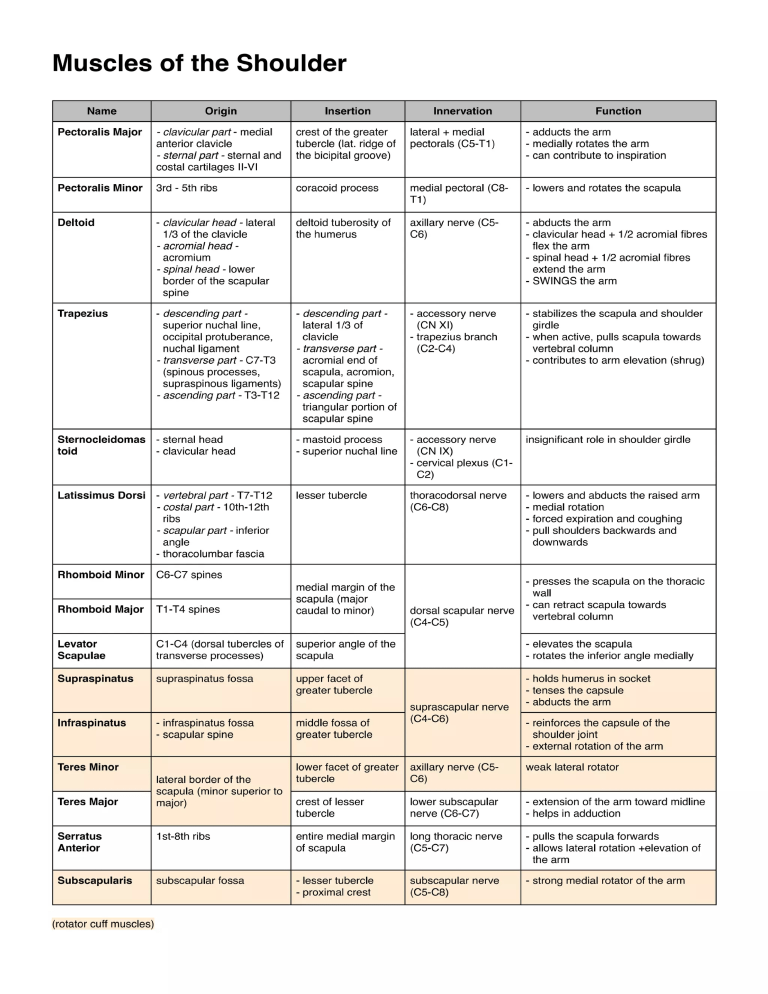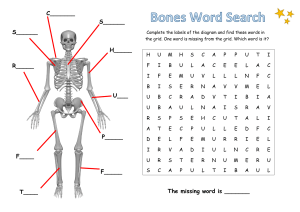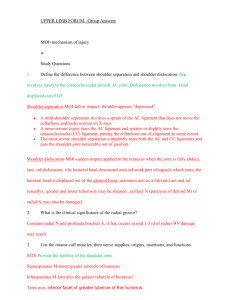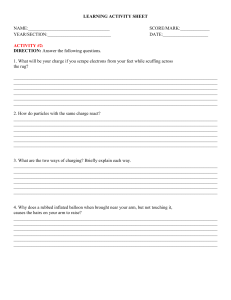
Muscles of the Shoulder Name Origin Insertion Pectoralis Major - clavicular part - medial anterior clavicle - sternal part - sternal and costal cartilages II-VI crest of the greater tubercle (lat. ridge of the bicipital groove) lateral + medial Pectoralis Minor 3rd - 5th ribs coracoid process medial pectoral (C8T1) Deltoid - clavicular head - lateral 1/3 of the clavicle - acromial head acromium - spinal head - lower border of the scapular spine deltoid tuberosity of the humerus | axillary nerve (C5C6) Trapezius - descending part superior nuchal line, occipital protuberance, nuchal ligament - transverse part - C7-T3 (spinous processes, supraspinous ligaments) - ascending part - T3-T12 - descending part lateral 1/3 of clavicle - transverse part acromial end of - accessory nerve (CN Xl) - trapezius branch (C2-C4) - stabilizes the scapula and shoulder girdle - when active, pulls scapula towards vertebral column - contributes to arm elevation (shrug) Sternocleidomas toid - sternal head - clavicular head - mastoid process - superior nuchal line - accessory nerve (CN 1X) - cervical plexus (C1C2) insignificant role in shoulder girdle Latissimus Dorsi - vertebral part - T7-T12 - costal part - 10th-12th ribs - scapular part - inferior angle - thoracolumbar fascia lesser tubercle thoracodorsal nerve (C6-C8) - Rhomboid Minor T1-T4 spines Levator Scapulae C1-C4 (dorsal tubercles of transverse processes) Supraspinatus supraspinatus fossa Infraspinatus pectorals (C5-T1) - infraspinatus fossa - scapular spine - adducts the arm - medially rotates the arm - can contribute to inspiration - lowers and rotates the scapula - abducts the arm - clavicular head + 1/2 acromial fibres flex the arm - spinal head + 1/2 acromial fibres extend the arm - SWINGS the arm scapula, acromion, scapular spine - ascending part triangular portion of scapular spine C6-C7 spines Rhomboid Major Function Innervation medial margin of the scapula (major caudal to minor) dorsal scapular nerve (C4-C5) lowers and abducts the raised arm medial rotation forced expiration and coughing pull shoulders backwards and downwards - presses the scapula on the thoracic wall - can retract scapula towards vertebral column superior angle of the scapula - elevates the scapula - rotates the inferior angle medially upper facet of greater tubercle - holds humerus in socket middle fossa of greater tubercle - tenses the capsule suprascapular nerve (C4-C6) - abducts the arm - reinforces the capsule of the shoulder joint - external rotation of the arm Teres Minor Teres Major Serratus lateral border of the scapula (minor superior to major) 1st-8th ribs Anterior lower facet of greater tubercle axillary nerve (C5C6) weak lateral rotator crest of lesser tubercle lower subscapular nerve (C6-C7) - extension of the arm toward midline entire medial margin of scapula | long thoracic nerve (C5-C7) - helps in adduction - pulls the scapula forwards - allows lateral rotation +elevation of the arm Subscapularis (rotator cuff muscles) subscapular fossa - lesser tubercle - proximal crest subscapular nerve (C5-C8) - strong medial rotator of the arm Muscles of the Arm Origin Name Coracobrachialis coracoid process Insertion Innervation Function medial surface of humerus musculocutaneous (C6-C7) - flexes the arm - holds the humerus in its socket Brachialis anterior surface of humerus ulnar tuberosity, below coronioid process musculocutaneous (C6-C7) - flexes the elbow joint Biceps Brachii - long head supraglenoid tubercle - short head - coracoid process - strong tendon - radial tuberosity - flattened tendon bicipital aponeurosis; fascia of the forearm; ulnar side musculocutaneous (C6-C7) - long head - abducts the arm, rotating medially - short head - abducts the arm - flexes the shoulder joint Triceps Brachii - long head infraglenoid tubercle extends between leres major and minor) - medial head - distal from the radial groove, dorsal surface of the humerus - lateral head - lateral and proximal from the radial groove ulnar olecranon radial (C6-C8) - extensor of the elbow - long head extends and adducts the arm Anconius dorsal surface of lateral proximal 1/4 of the radial (C7-C8) - assists triceps in extension epichondyle dorsal ulna (anterior compartment) (posterior compartment) Superficial Anterior Forearm Muscles Name Origin Insertion - pronates the forearm - flexes the elbow joint lateral surface of the humerus Pronator Teres Flexor Carpi Radialis median Palmaris Longus medial epichondyle of the humerus Flexor Digitorum Superficialis Flexor Carpi Ulnaris Function Innervation nerve - weak flexor and pronator of the elbow joint - palmar flexion of the wrist - radial abduction radiates into palmar aponeurosis - flexes the hand toward palm - tenses the palmar aponeurosis middle phalanges of 2nd-5th fingers - strong flexor of the wrist and finger joints - pisiform bone - hamate - 5th metacarpal ulnar nerve - palmar flexion - ulnar adduction of the hand Deep Anterior Forearm Muscles Name Pronator Origin Insertion Innervation Function distal ulna distal radius - pronation proximal 2/3 of the base of the terminal phalanges of the 2nd to 5th fingers flexor of wrist, midcarpal, metacarpophalangeal, interphalangeal joints Quadratus Flexor Digitorum Profundis palmar surface of the ulna and interosseous membrane Flexor Pollicis Longus - anterior surface of the radius (distal to radial terminal phalanx of the thumb anterior interosseous nerve (medial 1/2 of flexor digitorum profundis supplied by ulnar nerve) tuberosity) - flexor of terminal phalanx of thumb - abducts terminal phalanx of thumb in the radial direction - interosseous membrane Lateral Forearm Name Muscles Origin Insertion Innervation Function Extensor Carpi - common head of base of the 3rd - weak flexor of the elbow joint Radialis Brevis lateral epichondyle of the humerus - lateral collateral ligament - annular radial ligament metacarpal - brings the forearm to the midposition from ulnar adduction and extends it Extensor Carpi Radialis Longus suprachondylar ridge of | base of the 2nd the humerus metacarpal Brachioradialis suprachondylar ridge of the humerus radial surface of the styloid process of the radius , radial nerve - weak flexor of the elbow joint - supinator is the forearm is extended - produces dorsiflexion and radial abduction at the radiocarpal and mid-carpal joints - elbow flexor - brings arm to mid-position between pronation and supination Superficial Extensor Forearm Muscles Name Origin Insertion lateral epichondyle of the humerus (ulnaris also from the ulna) - forms the dorsal aponeurosis of the 2nd-5th fingers - slips of the tendons run to the bases of the proximal phalanges and to the capsules of the metacarpophalangeal joints - intertendinous connections between 3rd, 4th and 5th fingers Extensor Digitorum Innervation Function - extends and spreads the fingers - strong dorsiflexor of wrist and midcarpal joints - ulnar adductor deep branch of the radial nerve Extensor Digiti Minimi dorsal aponeurosis of the 5th finger - extends the 5th digit - helps in dorsiflexion and adduction of the hand Extensor Carpi Ulnaris base of the 5th metacarpal - strong ulnar adductor Deep Extensor Forearm Muscles Name Origin Supinator - supinator crest of the ulna - lateral epicondyle of the humerus Abductor Pollicis Longus - dorsal surface of the ulna (distal to the supinator crest) Insertion | radius Pollicis Extensor Pollicis Longus Function - supinates the forearm (in every position of flexion and extension) base of 1st metacarpal - flexes hand towards palm - abducts it radially bone - extension of the thumb - interosseous membrane - dorsal surface of the radius Extensor Brevis Innervation deep branch of the radial nerve radius (distal to abductor pollicis longus) base of proximal phalanx of thumb - extends the thumb dorsal surface of the ulna base of distal phalanx of thumb - extends the thumb - at the wrist, dorsiflexes and abducts the hand radially Extensor Indicis distal 1/3 of dorsal surface of ulna dorsal aponeurosis of index finger (2nd finger) - extends index finger - participates in dorsiflexion at the wrist and midcarpal joints




